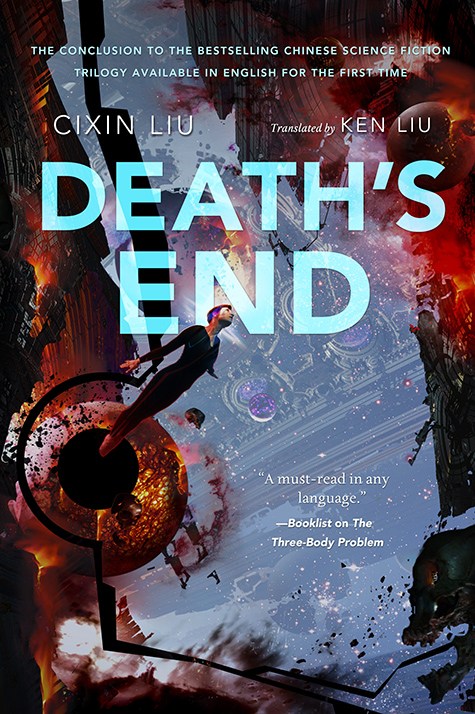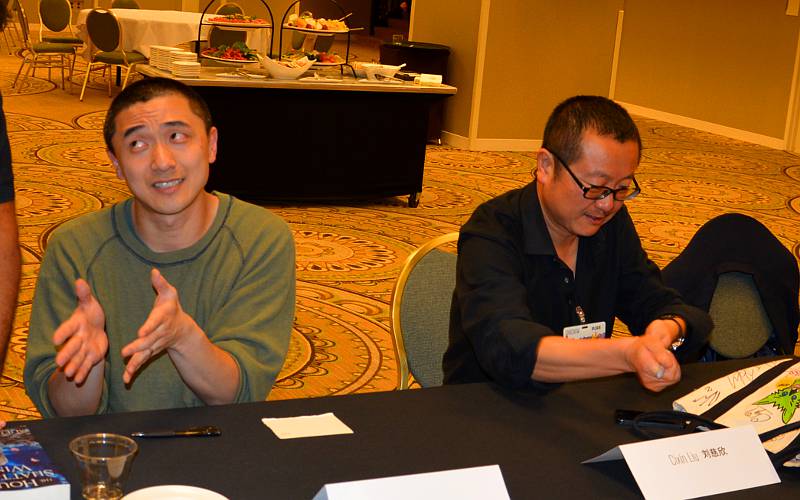Death’s End by Cixin Liu, (interviewed by Carl Slaughter)
Translated by Ken Liu
Publication date: September 20, 2016
CATALOG COPY
The concluding book in a a tour de force near-future adventure trilogy with the scope of Dune and action of Independence Day, from China’s bestselling and most beloved science fiction writer.
With The Three-Body Problem, English-speaking readers got their first chance to experience the multiple-award-winning and bestselling Three-Body Trilogy by China’s most beloved science fiction author, Cixin Liu. The Three-Body Problem was released to great acclaim including coverage in The New York Times and The Wall Street Journal. It was also named a finalist for the Hugo and Nebula Awards, making it the first translated novel to be nominated for a major SF award since Italo Calvino’s Invisible Cities in 1976. Now this epic trilogy concludes with Death’s End.
Half a century after the Doomsday Battle, the uneasy balance of Dark Forest Deterrence keeps the Trisolaran invaders at bay. Earth enjoys unprecedented prosperity due to the infusion of Trisolaran knowledge. With human science advancing daily and the Trisolarans adopting Earth culture, it seems that the two civilizations will soon be able to co-exist peacefully as equals without the terrible threat of mutually assured annihilation.
But the peace has also made humanity complacent. Cheng Xin, an aerospace engineer from the early twenty-first century, awakens from hibernation in this new age. She brings with her knowledge of a long-forgotten program dating from the beginning of the Trisolar Crisis, and her very presence may upset the delicate balance between two worlds.
Will humanity reach for the stars or die in its cradle?
PRAISE
- “The Three Body epic concludes with sweep and scope and majesty, worthy of Frederik Pohl or Poul Anderson, Scholar Wu or H. G. Wells. The universe is likely to be a rough neighborhood. See just how rough…and how life might still prevail.” -David Brin on Death’s End
- “The Three-Body Problem turns a boilerplate, first-contact concept into somethingabsolutely mind-unfolding.” -NPR
- “Liu Cixin’s writing evokes the thrill of exploration and the beauty of scale….Extraordinary.” – The New Yorker
BIO
CIXIN LIU is the most prolific and popular science fiction writer in the People’s Republic of China. Liu is an eight-time winner of the Galaxy Award (the Chinese Hugo) and a winner of the Nebula Award. Prior to becoming a writer, he worked as an engineer in a power plant in Yangquan, Shanxi.
KEN LIU (translator) is a writer, lawyer, and computer programmer. His short story “The Paper Menagerie” was the first work of fiction ever to sweep the Nebula, Hugo, and World Fantasy Awards.
[Post by Carl Slaughter.]
Discover more from File 770
Subscribe to get the latest posts sent to your email.



Somebody else will have to report back on this. I disliked The Dark Forest so much I’m not going to touch this one.
Good that Ken Liu is back as translator though.
I also found The Dark Forest disappointing, and I suspect a lot of that was due to the translator: I’ve like Ken Liu’s translations as they capture the flavor of reading something from a different culture but are written in unstilted American English with an ear for classic SF.. I remember large chunks of Three Body Problem: the Dark Forest is largely a blur.
I also think it’s more of a “conclusion” than a blow to the head…
I was so unimpressed with 3BP that I never tired Dark Forest. Probably never will.
Every author suffers under the handicap of only being able to have one first unveiling their amazing worldbuilding scenario. For those who liked Three-Body Problem as much as I did, I understood that The Dark Forest would, at best, expand on the physics and cosmology set up in the first book. I wasn’t going to have another wow-I-never-thought-of-that-before experience. And as all of us with experience reading trilogies know, the second book is always a challenge for an author for many reasons, not the least of which is the real climactic events have to be preserved for the third book.
And I should have been more direct – eyes to the title.
TYP: Yes, I needed a little 2×4 over the cranium awareness to get the point… Fixed now. Appertain yourself the beverage of your choice!
Love the cover. I haven’t read the 2nd book. I figure I’ll read the last two together. I wasn’t wowed by 3BP but I find I have a problem with the distance I feel in much of the stories I read by Chinese and Japanese authors so I’m reading more hoping to acclimate myself.
Autocorrect, the not-so-ancient enemy.
I’m very happy that Liu is translating. I thought he had a better hand than the Dark Forest’s translator.
I liked the second book better than the first one. I thought it was amazing.
Can anyone explain the reference to the water droplet in Death’s End?
I have been thinking for weeks but no satisfactory conclusion. Appreciate other’s insights (without spoiling). Thx